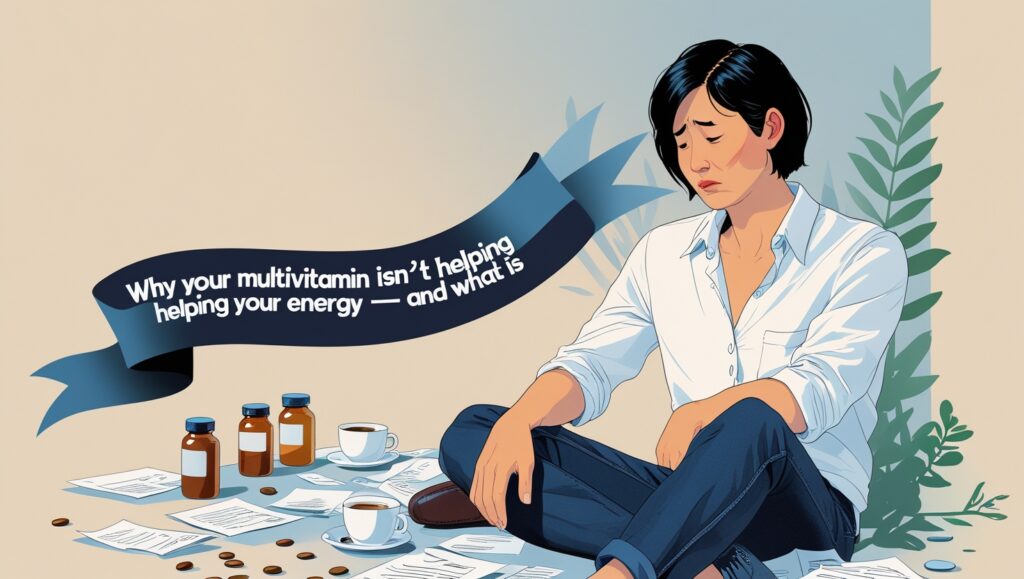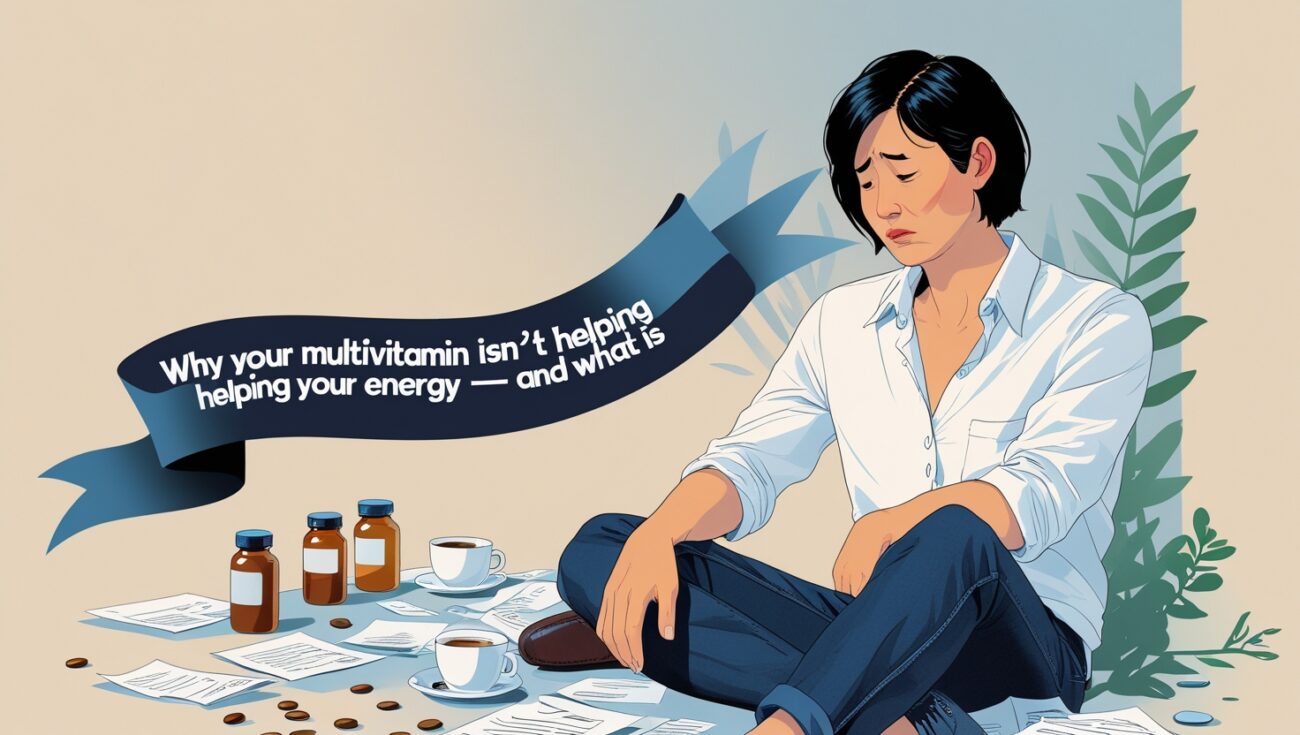The Overlooked Reason You’re Still Tired After a Full Night’s Sleep
You went to bed early. You stayed off your phone. You clocked in 8 hours of sleep. So why are you still waking up tired, groggy, and foggy? If you’re doing “everything right” and exhaustion still follows you into the day, there’s something deeper going on.
The truth is, it’s not just about how long you sleep—it’s about how well your cells recharge while you sleep. And most people have no idea their mitochondria are the hidden reason behind their persistent fatigue.

Table of Contents
What Are Mitochondria—and Why Should You Care?
Mitochondria are the “power plants” inside your cells. They convert food, oxygen, and nutrients into ATP, the energy currency your body uses for everything—thinking, moving, healing, even dreaming. If your mitochondria are weak or damaged, you can sleep all night and still feel like you haven’t rested at all.
Why Sleep Alone Isn’t Enough Anymore
We live in a high-stress, toxin-heavy, screen-filled world. That means your cells are under constant attack—and your mitochondria can’t repair or regenerate properly during sleep. Even deep sleep can’t fix exhausted cells without the right support.
Signs You Might Have Cellular Exhaustion
- You sleep 7–9 hours and still feel drained
- You wake up groggy or with brain fog
- You crash in the afternoon, even on low-stress days
- You’re sensitive to light, sound, or small stressors
- You’ve tried better pillows, blackout curtains, magnesium—and nothing works
What Finally Helped Me Wake Up Energized
I stopped guessing and started supporting my mitochondrial health directly. I began using a targeted supplement with:
- CoQ10 – for ATP production
- PQQ – for mitochondrial regeneration
- Nicotinamide Riboside (NR) – to boost NAD⁺
- Magnesium – for deep cellular repair
- Acetyl-L-Carnitine – for brain and nerve support
This is the exact supplement I now take daily. And yes, it finally made me feel awake when I woke up.
Deep Rest Comes from Cellular Repair
Your body repairs itself at night, but it can only do that if your cells have the tools they need. If you’re lacking essential nutrients or your mitochondria are struggling, your body can’t complete its nightly detox, hormone regulation, and brain reset.
Why Coffee Isn’t Solving the Problem
Caffeine may give you a temporary jolt, but it’s just a crutch. It stimulates your nervous system but does nothing to repair the real issue: broken energy production at the cellular level. Over time, this leads to dependency, crashes, and even more fatigue.
The Difference I Noticed in Just 10 Days
After a few days of mitochondrial support, I woke up feeling:
- Clear-headed
- Mentally calm
- Less dependent on coffee
- Stronger in workouts
- Actually refreshed by sleep
That’s something no multivitamin or bedtime tea ever gave me.
Why Most Sleep Supplements Fall Short
Melatonin and magnesium can help you fall asleep—but they don’t restore mitochondrial energy. That’s why so many people sleep “enough” but still wake up tired. You don’t just need sleep—you need cellular-level recovery.
Ready to Wake Up Feeling Refreshed Again?
If nothing you’ve tried has worked, don’t assume your body is broken. It’s likely just starved at the cellular level.
Support your cells here and give your body a real chance to recharge—the right way.
Fix the Cells, Fix the Fatigue
You can’t out-sleep a cellular energy problem. But once you address the real issue, everything changes—your mornings, your focus, your mood, your life.
Try the supplement I trust and recommend right here — and start waking up the way you’re meant to: energized.
Why Am I Still Tired After Sleeping 8 Hours?
If you’re sleeping the “recommended” 8 hours but still feel like you got hit by a truck in the morning, the problem isn’t sleep—it’s your cellular energy system. Without efficient ATP production, your body isn’t truly recharging, even if you’re unconscious for 8 hours.
How Mitochondria Influence REM and Deep Sleep
Mitochondria aren’t just about energy—they help regulate brain activity during REM and deep sleep stages. If they’re underpowered, your brain can’t fully cleanse itself of toxins or repair neural pathways, leaving you mentally foggy and emotionally fatigued.
Sleep Apnea Isn’t the Only Cause of Daytime Fatigue
Many people assume their tiredness is sleep apnea or stress—but mitochondrial burnout is a hidden and often ignored factor. And it’s not detectable with a sleep study. You have to address it nutritionally and at the cellular level.
ATP Is the Key to Feeling Rested, Not Hours Slept
ATP (adenosine triphosphate) is the fuel your body makes while you sleep to heal, detox, and restore. If you’re not producing enough, you could get 10 hours and still wake up like you barely slept. ATP is what actually gives you real rest and rejuvenation.
Nutrient Deficiencies That Kill Mitochondrial Energy
Most people are deficient in magnesium, B vitamins, and CoQ10—three core nutrients needed for ATP production. If you’ve never supplemented these (or only used low-quality forms), your cells might be starving for energy, even with a healthy diet.
The Role of NAD⁺ in Sleep and Recovery
NAD⁺ is a coenzyme that helps power your mitochondria and regulate circadian rhythms. Low NAD⁺ levels have been linked to poor sleep efficiency, sluggish mornings, and accelerated aging. Supporting NAD⁺ naturally was one of the biggest game-changers in my routine.
This is what I used to do it
Are You Mistaking Fatigue for Laziness?
If you feel like you’re underperforming, procrastinating, or always tired—it’s probably not a character flaw. It might be biological. When your energy system is broken at the cellular level, your motivation tanks. Fix the mitochondria, and your drive returns.
Can Mitochondrial Repair Improve Mental Health?
Yes. Your brain consumes more energy than any other organ. Poor mitochondrial function has been linked to depression, anxiety, brain fog, and emotional instability. Once I began supporting cellular repair, I felt more emotionally grounded and mentally sharp.
Natural Ways to Repair Mitochondria While You Sleep
- Take a mitochondrial support formula with PQQ and CoQ10
- Avoid eating 2–3 hours before bed
- Sleep in total darkness to regulate melatonin and mitochondrial cycles
- Use red light therapy in the evening
- Practice stress reduction to reduce cortisol and oxidative stress
Why Your Multivitamin Isn’t Enough
Multivitamins don’t include mitochondrial-specific ingredients like NR, PQQ, or Acetyl-L-Carnitine. They’re general support—not deep cellular repair. If you want to truly wake up rested, you need to target your energy at the source.
You Don’t Need More Sleep — You Need Better Cell Function
You’ve probably tried melatonin, magnesium, sleep teas… but they only scratch the surface. Real recovery happens when your cells repair while you sleep. This doesn’t require more hours—just smarter support.
The Fix That Finally Helped Me Wake Up Rested
Once I started a supplement designed for ATP restoration and mitochondrial repair, everything changed. No more waking up foggy. No more dragging all day.
Here’s the supplement I use daily and recommend to all my friends

